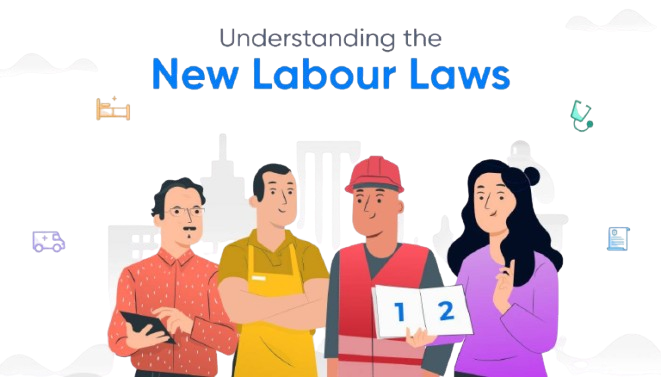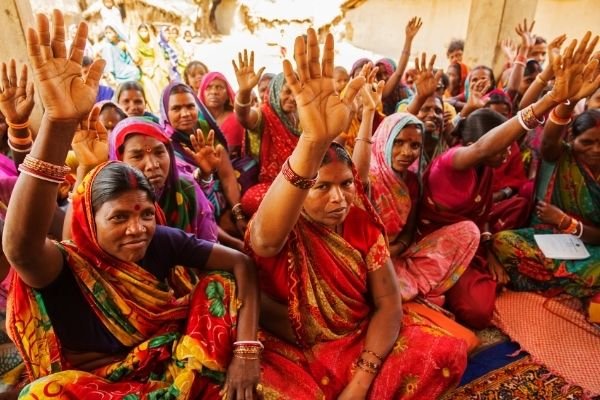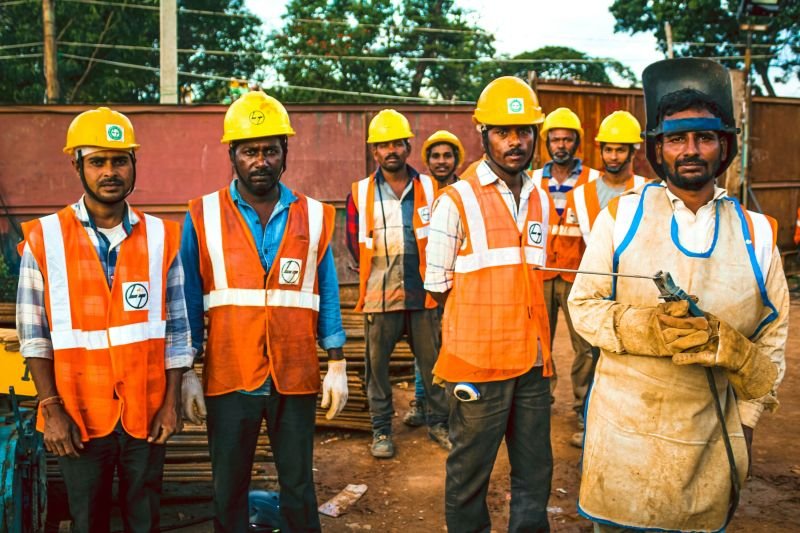National Alliance of Independent Labour Unions
(NAILU)
Press Releases
The National Alliance of Independent Labour Unions (NAILU) has consistently highlighted critical labor issues through multiple press releases. In February 2021, NAILU condemned the central government’s failure to maintain data on migrant workers affected during the COVID-19 lockdown, emphasizing that this administrative oversight jeopardizes policy-making and the welfare of this vulnerable workforce. By July 2021, NAILU demanded the repeal of four new labor codes, describing them as a regression in workers’ rights and calling for the involvement of labor unions in future reforms to ensure protections for wages, job security, and working conditions. Earlier, in February 2019, the Supreme Court criticized the failure of central and state governments to utilize over ₹28,000 crores collected for construction workers’ welfare, underscoring negligence in fund allocation, lack of worker registration, and deprivation of social security benefits despite legal mandates. More recently, in April 2023, NAILU submitted a memorandum urging urgent reforms for domestic workers, spotlighting their critical yet unrecognized role, poor working conditions, absence of social security, exposure to abuse, and challenges in unionization. Taken together, these efforts underscore NAILU’s persistent advocacy for labor rights, transparency, adequate funding, and inclusive policies addressing the needs of migrant, construction, and domestic workers across India.
On Labour Code
Press release on Covid
Press release on Domistic
SC Order on Cess
NAILU Demands Repeal of New Labour Codes: “Rollback of Justice for Workers”
Date: July 29, 2021
Location: Bhubaneswar
The National Alliance of Independent Labour Unions (NAILU) has issued an urgent call to repeal the four new labor codes – the Code on Wages, Industrial Relations Code 2021, Occupational Safety, Health and Working Conditions Code, and the Code on Social Security – citing them as a serious rollback of workers’ rights and protections.
“These new labor codes compromise the very foundation of workers’ rights,” said Dr. G. B. Nath, Labor Policy Analyst. “This is not just a policy shift – it’s a rollback of justice for the working class.”

Gopinath Barik
workers.”
A.R. Anupam
Dr. R. S. Tiwari
Mr. Vikash
Dr. Dibendu Kumar
Sushama Sahu
Call to Action
This collective statement from NAILU and allied voices underscores the need for inclusive, participatory labor reform rather than imposed policy shifts that risk deepening inequality.
NAILU calls upon the Government of India to reconsider the far-reaching implications of the new labor codes and engage meaningfully with worker representatives to uphold labor justice and social protection.
Issued by:
National Alliance of Independent Labour Unions (NAILU)
Contact: 9437961278 Email: nailuunions@gmail.com
NAILU Condemns Central Government’s Failure to Keep Data on Migrant Workers Affected During COVID-19 Lockdown
February 2021
For Immediate Release
The National Alliance of Independent Labour Unions (NAILU) has expressed deep disappointment and outrage over the central government’s failure to maintain accurate data on migrant workers who lost their jobs and lives during the COVID-19 lockdown. In a shocking revelation, Minister of Labour and Employment Santosh Kumar Gangwar informed the Lok Sabha that the Ministry had no data on the number of migrant workers impacted by the lockdown, despite widespread job losses and fatalities.
Dr Golak Behari Nath, Policy and Research Director, echoed these concerns, stating, “Data is the foundation of policy. Without it, the government cannot claim to address the needs of migrant workers. This is not just an administrative failure, but a human one.”

National Convener Mr. A.R. Anupam
Dr. R.S. Tiwari, National
Campaign Coordinator
Mr. Bikash , Media and
Communications Coordinator
Mr. Gopinath Barik, Labour Rights Advocate
NAILU demands immediate corrective measures from the government, including:
1
2
3
NAILU reiterates its commitment to fighting for the rights of migrant workers and will
continue to advocate for justice, transparency, and accountability in addressing the needs of
India’s labor force.
NAILU Submits Memorandum to Union Labour Minister Urging Immediate Reforms for Domestic Workers
New Delhi | April 12, 2023
The National Alliance of Independent Labour Unions (NAILU) has submitted a comprehensive memorandum to the Honorable Minister of Labour, Government of India, drawing attention to the urgent and long-standing issues faced by domestic workers across the country.
In the memorandum, NAILU highlighted the critical role played by domestic workers-many of whom are women-in supporting households through childcare, eldercare, cleaning, cooking, and other essential services. Despite their indispensable contributions, domestic workers remain largely invisible in the eyes of the law, with minimal protection or recognition.

Key Concerns Raised
NAILU’s memorandum identified several major challenges plaguing domestic workers:
Lack of social security
Including health insurance, pensions, and maternity benefits.
Exploitative working conditions
Exclusion from labour laws
Rendering them vulnerable to abuse and exploitation.
Gender-based violence
And harassment at the workplace.
Difficulties in unionization
Due to the informal and individualized nature of their employment.
Concrete Recommendations
To address these concerns, NAILU has proposed a set of actionable policy recommendations:
Enactment of a dedicated legislation
Creation of a national registry
Extension of social security schemes
Implementation of a minimum wage policy
Skill development and certification programs
Enforcement of safe working conditions
Accessible grievance redressal systems
Awareness campaigns
Call for Immediate Action
NAILU’s National Convener, AR Anupam, and Policy Coordinator, Prof. Golak Behari Nath, jointly emphasized that these reforms are essential to ensure justice, equity, and dignity for millions of domestic workers. They reiterated NAILU’s readiness to collaborate with the government in shaping and implementing policies that can uplift this vulnerable section of the workforce.
“With the right policies in place, domestic workers can be empowered to live and work with dignity. It’s time the nation recognizes their contribution and grants them the legal protection they deserve,” said Prof. Nath.
NAILU has urged the Ministry to treat this issue with priority and initiate dialogue on policy reform. The alliance reiterated its commitment to continue advocating for the rights of unorganized and informal sector workers across India.

Supreme Court Slams Governments for Failing Construction Workers: Rs. 28,000 Crores Unutilized
SC Demands Accountability for Cess Collected but Not Spent on Workers’ Welfare
New Delhi | 18.02.2019 – The Supreme Court of India has issued a scathing judgment, holding both state and central governments accountable for the gross mismanagement of welfare funds meant for construction workers. Despite collecting over ₹37,400 crores under the Building and Other Construction Workers (Regulation of Employment and Conditions of Service) Act, 1996 (BOCW Act) and the Building and Other Construction Workers’ Welfare Cess Act, 1996 (Cess Act), only ₹9,500 crores have been utilized, leaving ₹28,000 crores unspent. The judgment calls for immediate remedial action to ensure the welfare of millions of unorganized construction workers in India.

Key Findings of the Judgment:
Non-Implementation of Laws:
Workers Deprived of Social Security
Failure of Monitoring Mechanisms:
Unspent Cess Funds:
Government Apathy and Legal Inaction:
SC’s Directives:
The Supreme Court has laid out the following key measures to ensure proper implementation
of the BOCW Act and Cess Act:
Comprehensive
Audit
State Welfare Boards must be audited by the Comptroller and Auditor General of India (CAG) to track fund utilization.
Accountability in Cess Collection & Disbursement
Mandatory
Reporting
Labour Ministries and Welfare Boards must file progress reports regularly to ensure transparency.
Strict
Monitoring
A national-level monitoring committee will be established to track implementation and fund utilization.
Reactions from Labour Rights Advocates & Experts:
Dr. G. B. Nath, Labour Policy Analyst,
“This judgment is a landmark in ensuring workers’ rights. The fact that ₹28,000 crores remain unspent shows the systemic neglect of construction workers. The government must act now to ensure every rupee reaches the workers it was meant for.”
Rakshyakar Anupam, National Convener, National Alliance of Independent Labour
Unions (NAILU)
“The Supreme Court has exposed the grim reality that our governments have failed construction workers. The collected funds must be immediately redirected towards pensions, accident relief, and housing support. We demand a transparent and time-bound action plan.”
Gopinath Barik, Policy Consultant on Labour
“The SC’s intervention is critical. The labour welfare cess is meant for workers, not to be hoarded by the government. We call for a workers’ audit committee to oversee fund utilization.”


Dr. R. S. Tiwari, National Alliance of Independent Labour Unions (NAILU)
“The judgment reinforces what we have been advocating for years—cess funds should not be misused. The SC must monitor implementation through periodic compliance reports to ensure justice for construction workers.”
Mr. Vikash, Labour Rights Advocate
“This is a historic moment for labour rights in India. We demand mandatory social security for all construction workers, along with universal ID cards to ensure they receive benefits, regardless of migration.”
The Supreme Court’s judgment exposes the systemic negligence in utilizing ₹28,000 crores meant for construction workers’ welfare. Governments must be held accountable for this injustice. Immediate action is needed to ensure these funds serve the workers who build our nation!” – SR Ravi, National Campaign Coordinator #WorkerRights #CessUtilization #SupremeCourtCall for Immediate Action
Labour rights organizations, including Progressive Sramik Manch (PSM) and NAILU, have called upon the central and state governments to immediately:
Identify and register all eligible construction workers
Ensure proper utilization of funds
Hold negligent officials accountable
Launch awareness campaigns
This judgment has sent a clear message-construction workers cannot be ignored any longer. The challenge now lies in ensuring that this landmark ruling is enforced in both letter and spirit.
